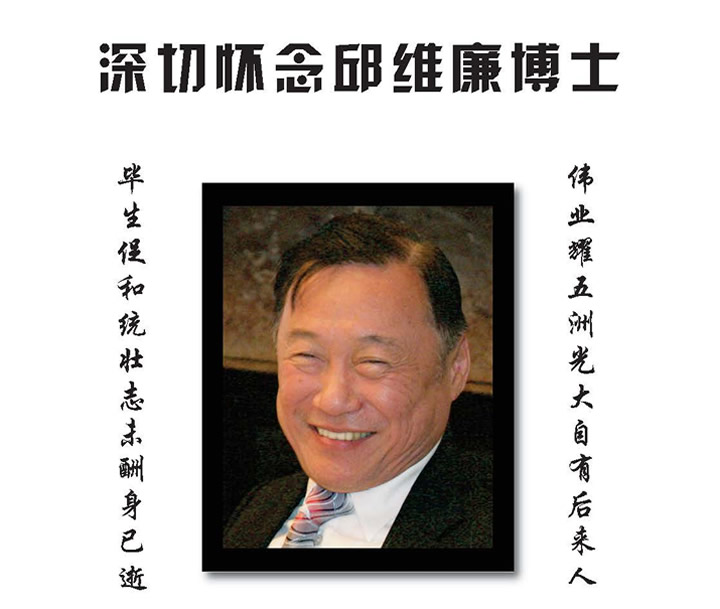Mr RUDDOCK (Berowra) (19:35): I am always a little disappointed to follow speeches where requests are
made for additional funding for programs but no ideas are proffered about where the Commonwealth is going
to get the money to pay for them and then votes are recorded in this place against measures that are designed to
ensure that we are properly resourced to be able to meet those many requests. But that is not the reason I want
to speak tonight. I think this place is elevated when we can address matters of quite a different character.
I want to record that on 26 May last, tragically, a very fine Australian passed away. His name was William Chiu.
A memorial service was held in Sydney Town Hall on Sunday. My good friend the member for Banks, David
Coleman, was there representing me and our party because there were many hundreds of Australians, including
many of Chinese descent, who took the opportunity to bid him farewell.
He was born in Malaysia. He was educated in Australia and New Zealand. He earnt two master's degrees: one
in chemistry and one in commerce. He held an honorary doctorate from the University of Western Sydney,
and it was a great pleasure to be there on the occasion on which he received that award. He was the founding
chairman of an organisation that has a rather strange name—the Australian Council for the Promotion of Peaceful
Reunification of China. Some people are very interested in the title. My emphasis is always on 'peaceful'. It is an
organisation to which he provided very effective leadership and it had undertaken, as I will elaborate, on raising
money for very fine causes.
Dr William Chiu was widely recognised for his service to many Australian Chinese groups. He dedicated his
time to promoting trade, culture, education, health and research cross-culturally. He was state patron of the New
South Wales branch of the Australia China Business Council. He was a member of the New South Wales-Asia
Business Advisory Council. He was chairman of the 2002 international peace conference. He had membership
of the New South Wales Parliament Asia-Pacific Friendship Group. He was a strong advocate for increasing
trade between Australia and China, and I think he would have been thrilled to see the signing of the free trade
agreement recently with China.
He was the inaugural patron of the University of Western Sydney Foundation. The foundation raised funds for
education, and UWS valued his ability to promote that foundation, while he was alive, through his extensive
business connections and contacts. He was the principal sponsor of the Sydney Powerhouse Museum for its
exhibition on the Great Wall of China in 2006, which was visited by over 113,000 people during its season. He
provided a unique opportunity for Australians, particularly Chinese-born Australians, to gain new insights into
China's rich history and culture. He was convenor and donor for the Sydney Chinese community support for the
Victorian Bushfire Appeal in 2009, raising almost a quarter of a million dollars. He personally donated $20,000
and was a driving force in organising the Sydney Chinese community for later appeals.
For 12 consecutive years since 2003 he was a major sponsor and Chairman of Eyes on China—a free medical
mission to Tibet, Sichuan, Yunnan, Inner Mongolia, Xinjiang, Guizhou and Guangdong to help cataract sufferers
regain their sight and restore normality to their lives. This mission involves Australia using its unique skills to
assist in that task, and something in the order of 50 Australian eye surgical specialists and medical personnel
over the years have participated in this program; it was particularly important.
He was patron of the Australian Hokkien Huay Kuan Association, which has a long history in Sydney. The
association was established to provide support services to migrants from Fujian. His family grew up in Fujian,
although, as I said earlier, he was born in Malaysia. He was Chairman and major sponsor of the World Fujianese
Conference in 2005, which hosted more than 1,500 people. In cooperation with many other organisations, he
initiated an educational organisation, the Australian Chinese-Classics Reciting Centre, providing a platform for
Australian children, whether of Chinese origin or not, to understand Chinese culture and to promote much closer
relationships.
As you can see, his resume is extraordinary—it speaks for itself. He was a man who spent his adult life as an
advocate for international cooperation. We should be very proud of him and we will miss him greatly. |
邱维廉先生是杰出的社会活动家,著名侨领,中国人民政治协商会议第十届、十一届、十二届全国委员会委员,中华全国归国华侨联合会第六届、七届、八届、九届常委,中国和平统一促进会常务理事,中华海外联谊会常务理事,中国海外交流协会顾问,中国侨商联合会创会会长,中国侨商投资企业协会监事长,中国华侨公益基金会副会长,香港侨界社团联会主席,澳洲中国和平统一促进会创会会长、永远荣誉会长,国际狮子会亲善大使,香港金晖国际集团董事长。邱维廉先生因病于2015年5月26日11时在北京逝世,享年68岁。
邱维廉先生1947年10月27日出生于马来西亚吉隆坡。祖籍福建省永春县。其父邱祥炽老先生系当地著名华商。1960年至1971年,邱维廉先生前往澳大利亚和新西兰求学,并获得化学和工商管理两个硕士学位。
1972年至1974年,邱维廉先生返回马来西亚管理家族企业。1975年,他在瑞士银行学习金融系统管理,1976年至1977任法国雷诺集团顾问,1978年任英国汤姆逊航天集团顾问、英国皇家威斯蓝公司顾问。1982年,他创立香港金晖国际有限公司并任董事长;1987年至2010年任北京八达岭索道有限公司董事长;上海家畜遗传开发有限公司董事长。
邱维廉先生曾长期担任中国人民政治协商会议全国委员会委员。任职期间,他热心参与政府大政方针和重要事务的协商,为在两岸和平发展的新形势下有效开展海外“反独促统”活动积极建言献策。多年来,他致力于推动中国和平统一与世界和平,广泛联络世界各个社会团体推动和促进世界和平、和谐和融合。2000年7月,邱维廉先生在悉尼创立“澳洲中国和平统一促进会”。2002年,为打击台独分裂势力,他带领澳洲和统会举办“中国和平统一与世界和平悉尼大会”,这次盛会云集了来自世界70多个国家和地区的近千位华侨华人代表,让住在国政府及政界人士了解、理解乃至支持中国和平统一事业,增强了海外华侨华人在推动中国和平统一事业的影响力,对反独促统工作产生了深远影响。
十五年来,邱维廉先生矢志不渝地为中国和平统一而奔走呐喊。近年虽已疾病缠身,仍驰驱世界各地,积极推动中国海峡两岸的和平统一。他致力于促进澳大利亚多元文化与和谐社会建设,为推动中澳民间外交事业发展发挥了积极作用。邱维廉先生关注并积极投身中国的经济建设。80年代中国改革开放初期,他曾多次前往各地考察。1991年,投资545万美元建成了八达岭长城索道。1998年5月,邱维廉代表公司到柏林领取“欧共体第十九届管理服务优秀奖和技术创新奖”。1999年6月,他又前往美国纽约领取“世界优质服务美国金奖”。之后,邱维廉先生还与上海、广东合资兴办了种牛场,把澳大利亚“南德温种牛”引进中国,改良了国内部分肉牛品种的基因。
邱维廉先生热心澳大利亚和中国的慈善公益事业,不遗余力地支持中澳两国的教育、医疗、文化和赈灾扶贫事业。他在澳洲设立了智障残疾中心、妇女中心等,为需要帮助的当地居民提供免费疗养和治疗。当墨尔本等地发生山火等自然灾害时,他带头捐款捐物;他曾倾力支持中国申办奥运会。在中国申奥期间,邱维廉先生带头出钱出力,不辞劳苦地奔走世界各地,为中国举办奥运会做了有力的宣传。他倡议由华侨捐款修建奥运标志性场馆“水立方”,带来了海外侨胞的第一批捐款,并组织澳洲设计师到北京参与“水立方”的设计工作。在他的领导下,澳洲和统会与澳大利亚其它侨团一起组织万余名华人华侨在澳大利亚首都堪培拉护卫北京奥运火炬的成功传递。
2008年,邱维廉先生代表澳大利亚华侨华人社团向四川汶川地震灾区捐赠1000万元人民帀,并在全澳收购2700顶救灾帐篷,紧急空运到四川灾区。此后他多次前往四川灾区,带去大量的援助物资和医疗救助。此外,他领导澳洲中国和统会还为中国贫困地区捐建了40多所学校,其中,邱维廉先生个人捐助600余万元建立了20所小学和2所中学。对于有些落成的小学表示希望以他的名字命名时,他均予以拒绝。他十分关心中国华侨历史博物馆的筹建工作,曾带头捐款500万元人民币。他领导澳洲和统会组织的大型慈善公益活动——“侨心光明万里情”自2003年起每年组织来自澳洲、中国大陆及台湾地区的专家和医护人员前往中国贫困边远地区,为白内障患者进行义诊复明手术,使众多弱势患者重见光明。
2009年,邱维廉先生担任澳大利亚华人华侨“庆祝中华人民共和国诞辰60周年”庆典委员会主任,参与策划组织华人、华侨、留学生及澳洲各界人士近两万名,在悉尼歌剧院广场前举行庆祝活动,并邀请澳大利亚两党政界共同出席庆祝活动。鉴于邱维廉先生的重要贡献,2010年,他被澳大利亚新南威尔士州政府授予“梅光达社区服务终生成就奖”。2014年,他荣膺西悉尼大学荣誉博士,成为25年来第一位被澳大利亚西悉尼大学授予荣誉文学博士学位的华裔。2014年,他荣获中国国务院侨办颁发的“服务华社荣誉人士”荣誉证书。
邱维廉先生热爱和平,坚持真理,至诚至坚;他自强不息,锲而不舍,拼搏进取;他乐善好施、服务社会,无私奉献;他为人谦厚,生活俭朴,情操高尚。邱维廉先生的一生,是爱国的一生,奋斗的一生,奉献的一生。
|
